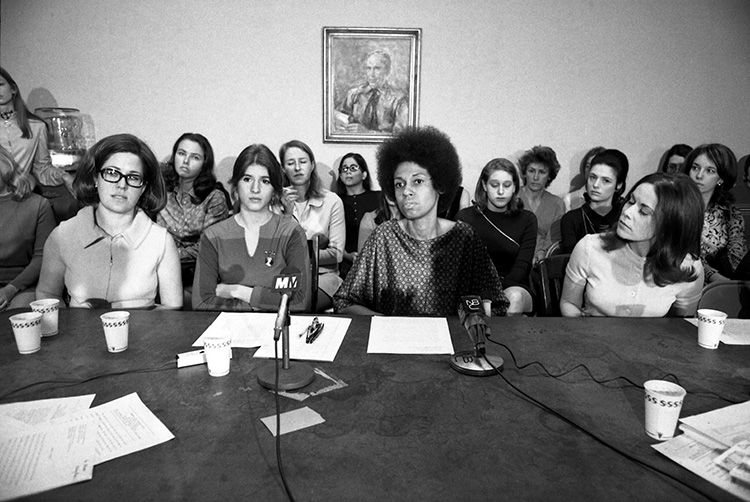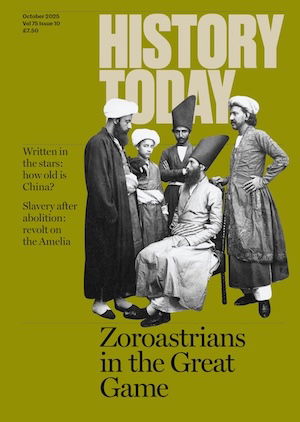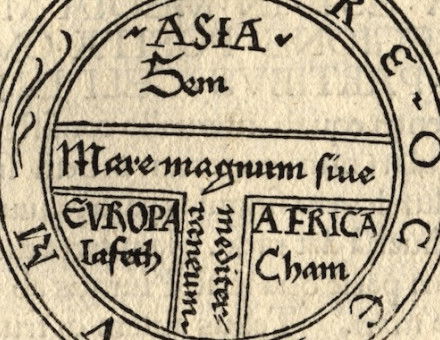Newswomen in Revolt
New US equality laws in the 1960s meant a revolution in journalism, as the women of the press fought for their place.
 Just as Rosie the Riveter found work in the factories during the Second World War, Rosie the Reporter was taken on by newsdesks. But in the postwar period many of the gains made by women journalists were reversed. By the 1960s, women could be hired at major newspapers, but, assuming they made it out of the mail room or secretarial pool, there was little room for growth, either individually or within the profession. So-called ‘women’s news’ was restricted to the women’s pages, typically a low-status department staffed almost entirely by those few women who had been promoted to reporting jobs.
Just as Rosie the Riveter found work in the factories during the Second World War, Rosie the Reporter was taken on by newsdesks. But in the postwar period many of the gains made by women journalists were reversed. By the 1960s, women could be hired at major newspapers, but, assuming they made it out of the mail room or secretarial pool, there was little room for growth, either individually or within the profession. So-called ‘women’s news’ was restricted to the women’s pages, typically a low-status department staffed almost entirely by those few women who had been promoted to reporting jobs.
Newswomen who did manage the transition to ‘hard news’ might be part of the White House Press Corps, but until 1971 they could not be members of the leading professional association, the National Press Club.
Unofficial discrimination against women in all areas of the media was no doubt assisted by the dearth of women in senior management roles. In 1972 there were just seven female members of the American Society of Newspaper Editors, all of whom were white and only four of whom were active editors.
Nowhere in the media was sex discrimination more prevalent than at the US weekly, Newsweek. What other outlets enforced through preferential treatment and unofficial biases, Newsweek institutionalised. Women were hired as mail girls, secretaries and researchers, while men with the same qualifications became reporters and writers. Many a gifted journalist, including Nora Ephron, whose screenwriting credits include When Harry Met Sally (1989), and Susan Brownmiller, author of Against Our Will: Men, Women, and Rape (1975), languished in their role before deciding to move on. The segregation was so evident that on March 16th, 1970, 46 women at the magazine filed a complaint against their employer with the Equal Employment Opportunity Commission for sex discrimination. It was the first time in the history of the United States that employees at a print publication had sued a company over the discrimination they faced simply for being women.
The Newsweek women timed their lawsuit to coincide with a cover story on the women’s liberation movement. Rather than being offered to one of the women employed at the magazine, however, the story was written by the wife of a male Newsweek reporter.
The Civil Rights Act of 1964, signed by President Lyndon B. Johnson, made this landmark lawsuit possible. The Act banned discrimination in a variety of areas, but it was Title VII, which made it unlawful for any employer to discriminate or segregate on the basis of ‘[an] individual’s race, color, religion, sex, or national origin’, which proved critical to efforts by activists in the years ahead. Similarly fundamental was the Equal Employment Opportunity Commission (EEOC), a federal body established under the Act to monitor the new laws and investigate discrimination complaints. After the Equal Employment Opportunity Act of 1972 was passed, the EEOC was able to act as a plaintiff and did not have to rely on convincing aggrieved parties to file their own lawsuits. Even in the intervening years, before the Commission’s authority was expanded, the EEOC quickly became the chief body to which complainants could direct formal grievances and finally have them heard.
Although women in the media were by no means the only employees making use of the EEOC and Title VII’s provisions a wave of cases rolled in – whether inspired by Newsweek or not. Again and again the same grievances were given: a lack of women in senior roles and of opportunities for career advancement and a failure to pay women the same wage as men for equal work.
In May 1970, 96 women at Time Inc. (which owned Time, Fortune, Life and Sports Illustrated magazines) filed a sex discrimination complaint against their management. Eight female employees sued Reader’s Digest in 1973 on behalf of over 5,600 women employed at the company. In 1974, six New York Times women filed a headline-grabbing lawsuit, which was not settled until 1978. At the Washington Post, Washington Star, Newsday, Baltimore Sun, Detroit News, New Haven Journal-Courier, San Francisco Chronicle, Associated Press, Reuters and more, the suits filed in. At NBC, 50 women journalists won a $2 million settlement on behalf of 2,700 women, proving this phenomenon was not restricted to the print media.
The ‘sex’ provision of Title VII was not the only one to get a workout in the 1970s. Race discrimination cases were filed at the Washington Post and the New York Times, citing complaints similar to those of the women, but this time on behalf of minority employees.
The majority of these cases were settled out of court before they could go to trial. The Reader’s Digest, Associated Press and New York Times agreements all made headlines because of the large cash settlements won by female employees. This comprised back pay for the plaintiffs and, in the case of the Associated Press and Reader’s Digest, money for women’s training programmes. Employment plans and scholarships – Affirmative Action programs, although not always explicitly named – were similarly included in settlements at the Washington Post and Newsday.
Despite these concessions, once the settlements were signed, the newspaper management maintained that they were not guilty of any wrongdoing. Regardless of their insistence, the training and scholarship programs did increase the diversity of newsrooms in the late 1970s and into the 1980s.
Additionally, the close media coverage of Title VII sex discrimination complaints and the threat of an EEOC-supported lawsuit, forced managers finally to take seriously the accusations of women employees, which they had previously waved aside.
As for the Newsweek women, progress was slow and, after filing a second EEOC complaint, they settled in 1973. Interest in their suit had a brief resurgence in 2016 when Amazon Video aired Good Girls Revolt, a shortlived semi-fictionalised account of the events at Newsweek, based on the 2012 book of the same name by an original signatory, Lynn Povich, who went on to become the weekly’s first female senior editor. Critics rated the first season positively, while the programme’s creator reported that it had received good audience figures. Yet Good Girls Revolt was cancelled in early 2017 and no women were involved in the decision to take it off the air.
Despite Povich’s rise through the ranks and the many victories resulting from the sex discrimination lawsuits, it appears that the discussion about the absence of women in senior media positions – and the repercussions of this – is far from over.
Marama Whyte is a PhD student at the University of Sydney, Australia researching activism by women in the US media in the 1960s-80s.




